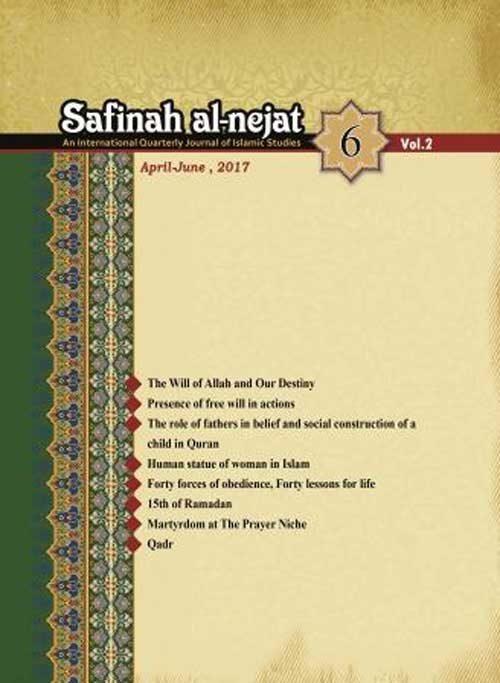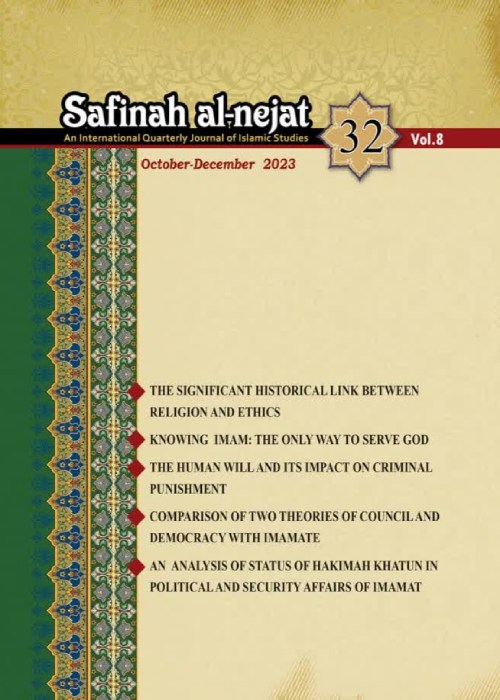فهرست مطالب

Safinah al-nejat
Volume:2 Issue: 6, Spring 2017
- تاریخ انتشار: 1396/04/08
- تعداد عناوین: 8
-
Page 5
-
Page 7In this article, several pieces of evidence from the holy Quran and Hadith are provided to show that the will of Allah is located in the heart of His vicegerent on the earth who has been assigned by Him as Imam, and that the Imam always volitionally accords his will with the will of Allah. Due to his reliance to Allah and his protection provided by Him, the Imam does not allow himself to will independently. Whether the information that Allah has not yet willed (i.e., the knowledge of the unseen) is observable for the Imam or not, is another issue that is addressed in the article.Keywords: Will of Allah, the protected board, the knowledge of the unseen
-
Page 19the common opinion among philosophers is that the realizations of external actions take place through gnosis, desire and will power. Action is the effect of free will and free will is the effect of eagerness; and eagerness is the effect of gnosis. Gnosis is the effect of external reasons. These reasons ultimately end up in the Necessary Being.
According to this theory, the three realizations of action, are not merely based on free will; God, through external causes and internal causes, is the cause of human beings action.
This theory faces serious problems, such as vagueness of the meaning of free will and its incompatibility with conscience (vujdan). The present study is to introduce this theory that free will and will power, in all three realizations of actions are significantly present and among these realizations from one hand and the approach and action on the other hand, there is bilateral and multi-lateral connection. -
Page 45It is quite explicit and clear that our Muslim aim is to reach human perfection that without knowing the actual position of women this is not feasible. Our aim in this research is to state Islamic viewpoints in respect to the actual position of women since the clarification of this issue has great impact on society individuals way of thinking namely women, the society which is most exposed to mental harm. This way and by clarification of thinking and beliefs of issue in hand and even higher womens proceeding for discovery of their virtual position in Islam can look hopeful.Keywords: the actual position of woman, equality of genders, Islamic viewpoints
-
Page 54The supplication of Abu Hamza al-Thumali is a Dua attributed to Ali Zayn al-Abidin. Abu Hamzah Al-Thumali, who was a companion of three Shia Imams, received it from Ali Zayn al-Abidin and was the principal narrator of the work. This supplication is mentioned in Eqbal al-a‟mal a work in Arabic authored by Sayyed Ibn Tawus that included Duas, prayers, and practices which were recommended to be performed at specific times of the year. It was said that Ali Zayn al-Abidin recited the supplication every evening or dawn during Ramadan. Thābit ibn Safiya, known as Abu Hamza alThumali, descends from the Safiye family. Born in Kufa, al-Thumali was a companion of three Shia Imams Ali Zayn al-Abidin, Muhammad al-Baqir, and Jafar al-Sadiq. Although there is little information about his birth, it is believed that he lived in the seventh and eighth centuries. Therefore, it is possible that he was a companion of Imam Kadhim, also.
Abu Hamza al-Thumali had great esteem for Imams, and they apparently considered him trustworthy. Ali al-Ridha, the eighth Imam of Shia, stated about him: "Abu Hamza in his time was similar to Salman in the prophet's time." Ahmad ibn Ali al-Najashi, a grand scholar of Shia, said: "He was the best of our companions and the most reliable of them in narration and tradition." He wrote several works about Islamic subjects such as the Kitab fi Tafsir al-Quran al-Karim (an exegesis of the Quran), Kitab al-Nawadir (a book on the rare things), Kitab al-Zuhd (on asceticism) and Al-Risalah al-Huquq (about all kinds of rights). He died in the year 150 A.H. -
Page 68The fifteenth of Ramadan is the birthday of Imam Hassan Mojtaba, the second Imam, the eldest grandson of the Prophet and the eldest son of Ali and Fatima. Mojtaba‟, Ameen‟, and Tagi‟ run among his titles.
-
Page 76In order to bring to light for our respected readers the incident and manner of martyrdom of Ali-ibn-Abi Talib (A.S.), the immediate successor of the Prophet and the first Imam of the Shias, we shall mention in brief the history and events prior to this incident which in fact led to the martyrdom of Ali (A.S.).
-
Page 96


